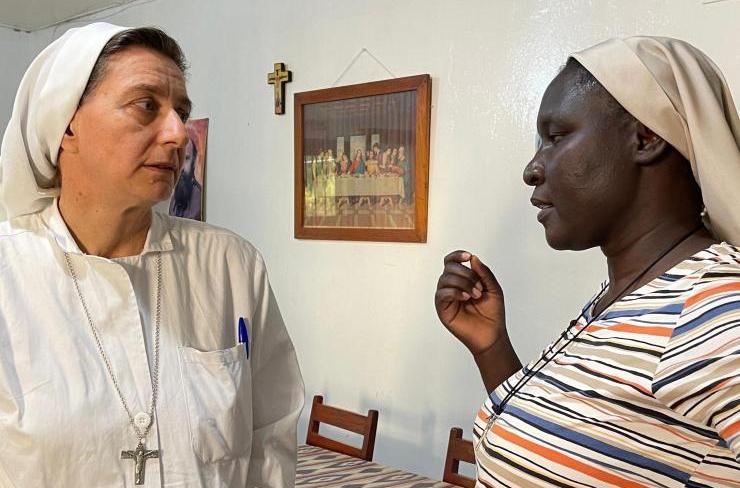A community of Comboni Missionary Sisters work at St. Joseph’s Hospital in Bébédjia, dedicating their lives with passion and joy to serving those most in need.
Bébédjia, a town located in the Eastern Logone region of Chad, a crossing point on the road that leads from Cameroon to the Central African Republic, is located 650 kilometres from Ndjamena, the capital of the country. There we met the community of Comboni Missionary Sisters who work at St. Joseph’s Hospital which belongs to the diocese of Doba.
Sister María del Pilar Justo, a Spanish Comboni Sister, almost 80 years old, welcomes us. She has spent 45 years in this country and is one of the nuns responsible for the administration of the hospital.
Sister Pilar recalls that it was Monsignor Russo who asked the Comboni Sisters to create a resident community and to help transform the then-small centre for disabled children that operated there, into a hospital.
The administrative director instead points out: “Since then, the hospital has developed both structurally and in terms of the services offered. Today we have several departments and the hospital’s medical and nursing staff has also increased in number and qualifications. Today there are 150 inpatient beds of which 46 are for paediatrics, 40 for medicine, 34 for maternity, and 30 for post-operative care. It has an average of about 1,000 patients per month and serves a population of more than 200,000”.
Due to its geographical position and the quality of the services offered, people come to the hospital not only from all over the country, but also from other African countries, such as Sudan, Central African Republic, Cameroon, and the Congo. Of the three doctors at the hospital, two are Comboni Sisters: Sister Elisabeth Raule, Italian, and Sister Susan Akullo Eyen, from the Democratic Republic of the Congo.
The climate here is dry and there is a lot of dust in the air due to the nearby desert. The days are warm and the nights cool. For this reason, the region has a high rate of viral diseases, malaria, respiratory infections and tuberculosis, diseases with a high mortality rate.
Malnutrition also persists and the maternal and infant mortality rate is one of the highest in the world (1,063 deaths per 100,000 births and 107 deaths per 1,000 births, respectively).
The hospital has a laboratory to carry out some analyses (especially for pathologies such as malaria and tuberculosis) and ultrasounds; there is also a team to monitor malnutrition which affects hundreds of children.
In the area where the outpatient service is provided, located to the left of the hospital upon entering, AIDS patients from all over the region, and from other latitudes, are treated. This service is provided by the Sisters of a Mexican congregation (Missionary Sisters of the Risen Christ), who live in an area of the hospital complex, and who treat these patients.
The Chadian government has built public hospitals and dispensaries in the province but, unfortunately, these facilities are only partially functional, as they often do not have the medicines or medical-surgical material to treat patients.
The administrative director confirms: “Saint Joseph’s Hospital does not receive any state support (the government only pays the salaries of the professionals who depend on the state and who work there)”.
Although it is located in a region where oil is most exploited, the profits obtained are not invested to promote the development of the local population. To finance the hospital and contribute to the purchase of materials and equipment, patients are asked for a small contribution, but above all, funds are obtained through projects from abroad.
However, as the hospital the administrative director reminded us, no patient is ever turned away if he cannot pay. Everyone is welcome, regardless of their social, ethnic, or religious condition (Chad is a Muslim-majority country). He continues: “Due to the evaluation of hospital efficiency by the State, which conditions the financing of public service providers, the city hospital of Bébédjia is often short of funds and sends terminally ill, or those with more complicated diseases, to us at St. Joseph’s”.
Sister Elisabeth, a surgeon, has been in Chad for over twelve years. We meet her after a long day spent in the operating room. The hospital has operations scheduled twice a week, but the pace of her work is affected by the number of patients who enter the hospital, especially those who arrive in a serious condition and require immediate care.
And these are the majority. Sister Elisabeth performs approximately 600 surgeries a year. Despite her difficulties, she states with a shy smile, “I am very happy here. I think I have learned a lot and I feel privileged. Being among patients is my world!”
The missionary doctor is the medical director of San Giuseppe Hospital. She explains that patients only come to the hospital when they are seriously ill because, initially, they resort to traditional remedies and seek healing from village healers.
But every day, she treats patients who have been involved in road accidents, have been attacked by animals or have been victims of stabbings, gunshots, or arrows. Many of these incidents are the result of clashes between farmers and nomadic shepherds, who invade fields and crops and, since they are armed, feel they can challenge the farmers.
One of Sister Elisabeth’s goals is prevention. For example, in the maternity ward, with the involvement of the nurses, she tries to explain to young mothers the basic hygiene and nutritional care that their children must have in order to grow up healthily.
As the evening falls, the sultry heat gives way to a pleasant coolness. In allocated places, the families prepare food for their loved ones who are patients while the nurses prepare for the night shift. The Comboni Sisters withdraw into their community but know that they can be called at any time to attend urgent cases, as often happens. (Bernardino Frutuoso)






